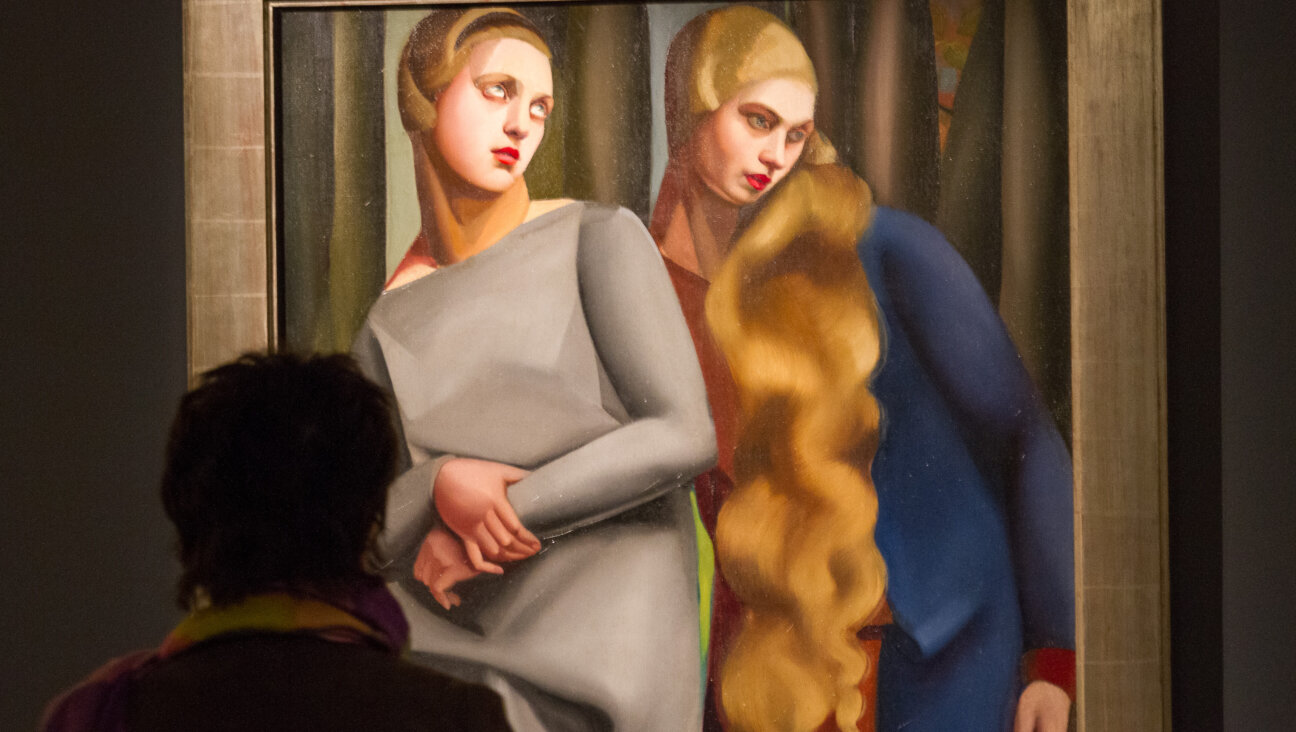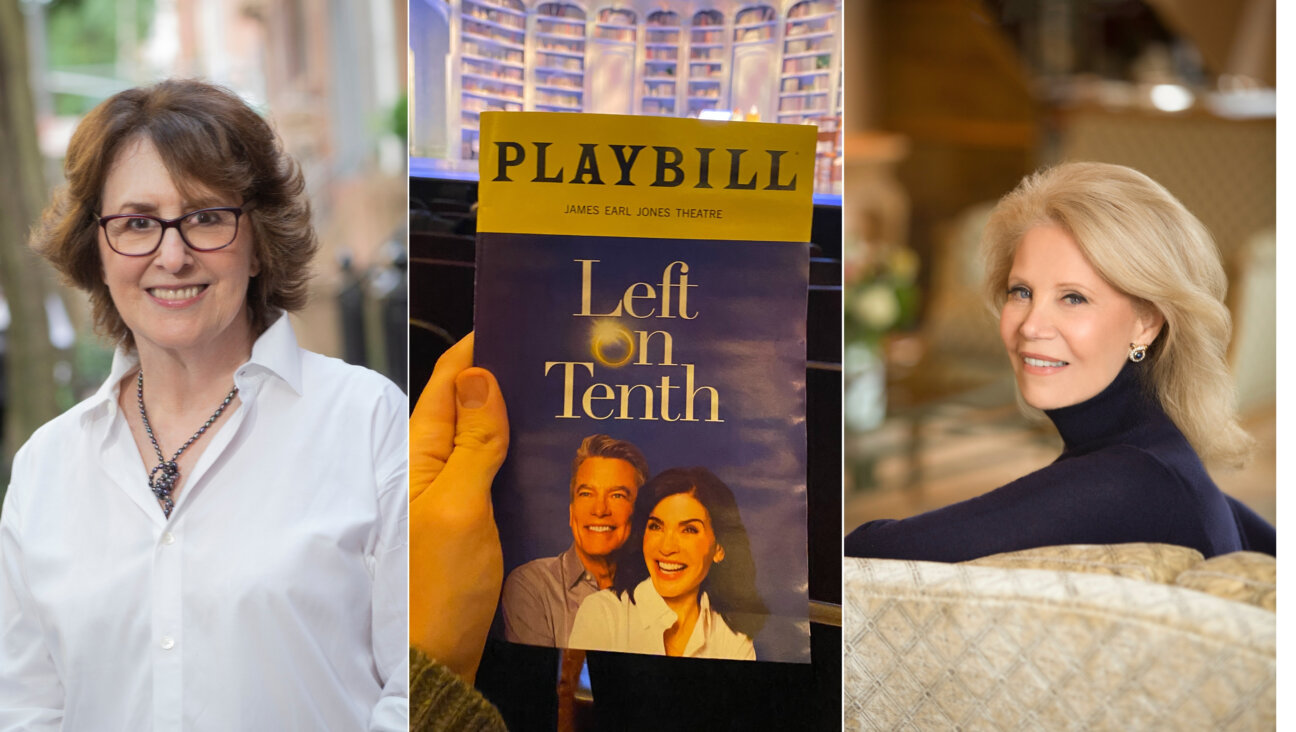Can a new Israeli Netflix historical drama succeed if it flunks history?
‘The Beauty Queen of Jerusalem’ spans the decades from Ottoman rule to nationhood. Yet somehow, the politics and events of the era are missing from the show.

Michael Aloni and Hila Saada as the central, Sephardi couple in “The Beauty Queen of Jerusalem.” Photo by YES Studios
Freedom fighters, a bombing, an unwanted marriage and a forbidden Sephardi-Ashkenazi affair: “The Beauty Queen of Jerusalem,” a new, long-awaited Israeli show, has it all. Based on a best-selling novel by Sarit Yishai-Levi and starring Michael Aloni of “Shtisel” fame — and produced by the same studio — it has all the ingredients to be a fan favorite.
Unfortunately, the political intrigue, insight into Israeli culture and rich character development that drew viewers to other Israeli hits, such as “Fauda” and “Shtisel,” are missing from this newest addition to the Yes Studios stable. Though the show is the kind of period piece that viewers of all backgrounds usually eat up — it flips between the waning days of Ottoman Jerusalem and 1937’s British Mandate Palestine — the history of these eras seems to be an afterthought.
Coming to Netflix at the end of the month, the show follows the life and trials of the Hermosas, a wealthy Sephardic family who own a shop in Machane Yehuda, Jerusalem’s major market. There’s handsome and romantic Gabriel, his overbearing mother Mercada and the doe-eyed, unloved wife Rosa, as well as their three daughters. There are births and deaths, marriages and affairs, family infighting and political scheming.
All this is established during the first four episodes, each one under an hour; somehow, despite packing in a tumultuous affair, a bombing and 17 years’ worth of events, the show still drags.
The book covers a time period from the Ottoman Empire to the late 20th century — four generations of the Hermosa family — and the show, which is presumably planning to eventually do the same, seems like it has to rush to fit everything in. (This choice also means its characters are unconvincingly aged up for some scenes; Aloni in particular suffers under a cumbersome gray wig.) As a result, its characters are underdeveloped, and the show relies on telling us who they are instead of showcasing their traits through dialogue — a real shame given Aloni’s subtle, studied character work in “Shtisel,” a show defined by its richly developed family.
But for a historical drama, what is more notable is the extreme lack of context. Outside of an opening scene in which Turkish soldiers knock threateningly on a poor Jewish family’s door, we see no evidence of Ottoman rule. In the scenes set during British Mandate Palestine, the Brits are jovial, uniformed soldiers who like to drink and date Jewish women. The Palestinian residents of Jerusalem — and the region’s growing tensions between its Jewish and Arab occupants — are unseen except for a guy who hauls goods for the Hermosas’ shop; his only character trait is sexism. Burgeoning Nazism in Europe, and the sudden surge it caused in Jerusalem’s Jewish population, goes unmentioned.

The show leans heavily on a tension between Jerusalem’s Ashkenazi and Sephardic population — and, uniquely, features scenes in Ladino — but doesn’t interrogate the relationship between the two. The Sephardi Jews in the show are far more wealthy and influential than the Ashkenazi, but outside of Jerusalem, the kibbutz movement was picking up, as was the movement for Israeli statehood, the leaders of which were largely Ashkenazi. Further confusing the representation of Ashkenazi and Sephardi tensions is the fact that two of the main Sephardi characters, Mercada and Gabriel, are played by Ashkenazi actors, including Aloni.
The only historical element depicted is the Jewish insurgency against the British rule; the character Ephraim is presented as some kind of dangerous hoodlum, part of a guerilla group. But Ephraim and his friends are far more disgusted by, and violent toward, Jews who are friendly with the British than they are toward the British themselves, a clearly villainous drive that feels disconnected from the politics of the time. Though the actual militant groups of the era, such as the Irgun and Haganah, certainly had murky morals and were often referred to as terrorists by the British, they’re usually hailed as heroes in modern Israeli history, and it’s odd to see them portrayed as evil racists, divorced from Zionism and geopolitics, while the British colonialists are fun-loving and friendly.
Perhaps the show lands better in Israel, where the viewers are presumably more familiar with the era’s history; it won several awards there. But even then, putting in no references or context — and changing the little that there is — seems off for a show billed as a sweeping historical drama, and possibly dangerous for an American audience with little context for the real events. And with the rushed pace, there’s little room for the show to excel in other areas, such as the intergenerational family relationships the book is known for.
On the other hand, decades ago, the American Jewish community ate up Leon Uris’ “Exodus,” another at-best quasi-historical romance set in pre-state Israel among the kibbutz movement and Haganah fighters. Maybe “The Beauty Queen of Jerusalem” will strike the same chord.
Correction: The original version of this article misstated the dates of the Ottoman Empire’s rule over Jerusalem.
A message from our Publisher & CEO Rachel Fishman Feddersen

I hope you appreciated this article. Before you go, I’d like to ask you to please support the Forward’s award-winning, nonprofit journalism so that we can be prepared for whatever news 2025 brings.
At a time when other newsrooms are closing or cutting back, the Forward has removed its paywall and invested additional resources to report on the ground from Israel and around the U.S. on the impact of the war, rising antisemitism and polarized discourse.
Readers like you make it all possible. Support our work by becoming a Forward Member and connect with our journalism and your community.
— Rachel Fishman Feddersen, Publisher and CEO
























